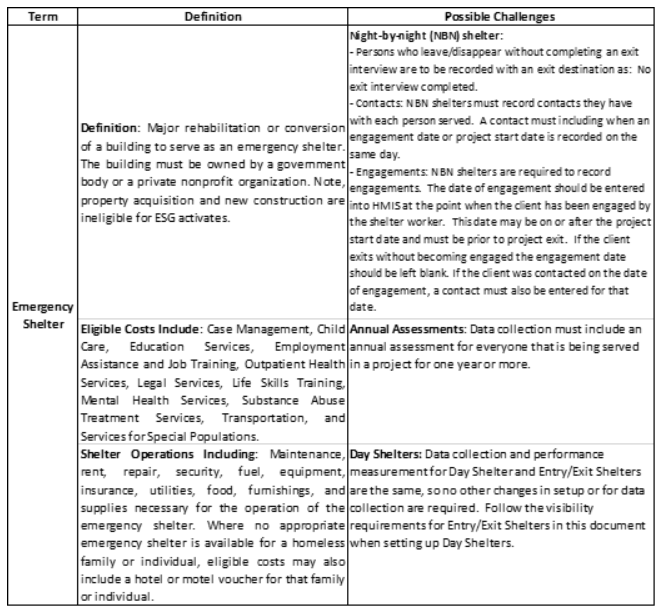 1424
1424
Contents
ESG Program Components, Eligible Costs and Possible Challenges
ESG Data Collection Requirements
ESG Project Performance Impact on CoC Performance
Background
The Emergency Solutions Grant (ESG) is a formula grant program for metropolitan cities, urban counties, territories and states that will be used to provide people experiencing homelessness and those at risk of homelessness, homelessness and at risk of homelessness as defined in 24 CFR 576.2 of the Code of Federal Regulation, with assistance. Recipients are able to sub-grant the ESG funds to private nonprofit organizations. State recipients must sub-grant all of their ESG funds (except for funds for administrative costs and under certain conditions, HMIS costs) to units of general purpose local government and/or private nonprofit organizations.
The McKinney-Vento Homeless Assistance Act requires Emergency Solutions Grants (ESG) Program and CoC Program recipients/sub recipients to participate in the HMIS. HMIS provides requirements for programming that assist in completing the homeless reporting section of the Consolidated Plan and ESG Program recipients in meeting annual performance reporting requirements.
For Victim Service Providers: ESG Programs and CoC Program recipients/sub recipients that are victim services providers, as defined by the McKinney-Vento Homeless Assistance Act, are prohibited from entering client-level data into an HMIS, but must use a comparable database
ESG Reporting Requirements
Recipients with HUD funding received through the Emergency Solutions Grants (ESG) Program are required to submit a Consolidated Annual Performance and Evaluation Report (CAPER) to HUD annually. A project-level CSV-CAPER Report is required to be submitted (by the sub recipient) to each ESG recipient that funded the project, using the data range specified by the recipient. ESG recipients are required to collect aggregated ESG Program information from each sub-recipient via the Sage HMIS Reporting Repository. Sub recipients can find additional information about ESG reporting requirements in the Sage ESG CAPER Guidebook for ESG-funded Programs.
ESG Recipients must report aggregated ESG Program information at the sub recipient level using SAGE.
SAGE Reporting
As noted above, the ESG CAPER report must be submitted via SAGE. In order for agencies to submit their CVS files they must receive an upload link from the entity that has provided them ESG funding. If you are an agency that has received ESG funding but has not received an upload link, please reach out to the entity that provided your funding.
Additional ESG Resources
For additional assistance, please refer to the following guidance on ESG Programs.
CoC APR and ESG CAPER HMIS Program Specifications
HMIS Data Quality Monitoring Toolkit
HMIS Project Setup
There is a difference between a program and a project that will need to be distinguished in order for the set up to be understood. A program is the source of funding that the organization is getting to run its project (e.g. ESG Program funding for ABC Emergency Shelter project). For data collection purposes, HUD and its federal partners refer to categories of funding within a program as components.
The ESG Program includes funding for four eligible components:
- ESG Street Outreach: engage homeless individuals and families living on the street
- ESG Emergency Shelter: help operate and provide essential services in emergency shelters for homeless individuals and families
- Shelter Operations
- Essential Services
- Renovations
- Homelessness Prevention: prevent individuals and families from becoming homeless
- Rapid Re-Housing: rapidly re-house homeless individuals and families
ESG Program Components, Eligible Costs and Possible Challenges

ESG Data Collection Requirements
ESG Projects are required to be in HMIS, and so they are required to collect HMIS Universal Data Elements. For more information on the ESG Data Elements refer to the ESG Program HMIS.
All ESG recipients and sub recipients for all project types are required to collect Universal Data Elements that include:

ESG eligible funding projects vary by project types, so the required data elements that are required to be collected also vary. ESG projects must collect data according to the chart below in order to generate the CSV-CAPER Report.

Project Start Date varies by project type, please see the Project Start Date knowledge based article for more information.
Bed and Unit Information
Projects which provide lodging (Emergency Shelters, Transitional Housing, and Rapid Re-Housing) must complete the bed and unit inventory information on all residential projects funded through ESG. This information should match the information provided by the CoC for the HIC. The bed and unit information in HMIS is based on the number and type of beds in the entire project, which may be more beds/units than are funded under ESG.
ESG Project Performance Impact on CoC Performance
HMIS is to report back to HUD on the System Performance of the entire CoC. With that in mind the data collected for ESG Projects in HMIS will affect the HUD System Performance Measures that are reported in the following areas:
- Measure 7a: Success placement from Street Outreach
- Measure 7a does not require a Date of Engagement for a client record to be included in the performance measure, only a project exit. Additionally, while data quality is only measured following the Date of Engagement, System Performance Measure 7a measures placement from street outreach beginning at the first contact/project start






